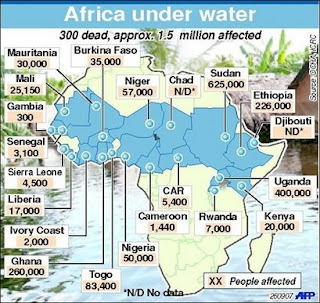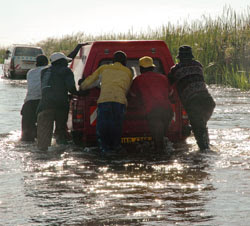Joel Madden joined the heroes over at UNICEF in 2008. He’s committed to supporting UNICEF’s water and sanitation programs, and is acting as the 2009 National Spokesperson for the U.S. Fund for UNICEF Tap Project.
Check out what he has to say about the project below.
 Last year, I got to see—up close—what it’s like when safe, clean drinking water is a luxury, not a given. I traveled to the Central African Republic (CAR), where a third of the people don’t have safe water. Instead of waking up in the morning and turning on the tap, they may have to walk miles to get water from a dirty stream. Or pay someone for a bucket of water that came from a contaminated well. In a health clinic in this great little town, Sam Ouandja, we met children who were sick and dying from drinking unclean water. It was awful. I’m a father and seeing kids dying for reasons that can so easily be prevented was something I just couldn't accept.
Last year, I got to see—up close—what it’s like when safe, clean drinking water is a luxury, not a given. I traveled to the Central African Republic (CAR), where a third of the people don’t have safe water. Instead of waking up in the morning and turning on the tap, they may have to walk miles to get water from a dirty stream. Or pay someone for a bucket of water that came from a contaminated well. In a health clinic in this great little town, Sam Ouandja, we met children who were sick and dying from drinking unclean water. It was awful. I’m a father and seeing kids dying for reasons that can so easily be prevented was something I just couldn't accept.But every day around the world, over 4,200 children die from water-related diseases. This year, I signed up to be the spokesperson for the U.S. Fund for UNICEF Tap Project, because I want people to be aware of this horrible truth. And do something to stop it. During World Water Week, March 22–28, the Tap Project raises money for UNICEF to bring clean water to millions of kids around the world. It works like this: restaurants ask people who come in for a meal to give $1 for tap water they’d usually drink free. That one buck can pay for a child to have clean drinking water for 40 days. This is a great, simple idea that makes a difference. Go check out the Tap Project website to find restaurants near you that are part of Tap this year. Or learn about all the other ways you can donate and get involved.
On my trip to CAR, I got to see some of the awesome work UNICEF is doing with the money we raise. I can’t tell you how great it felt to meet people who—because of UNICEF—had clean water in the refugee camp we went to. Or to hang out with kids at a school with a UNICEF well who were healthy—not sick from bad water. But I think about the kids I met in Sam Ouandja—children I sat with, played with, sang with… children who could die because they don’t have clean water. You can really make a difference for kids like these with the Tap Project. So please—get involved!













